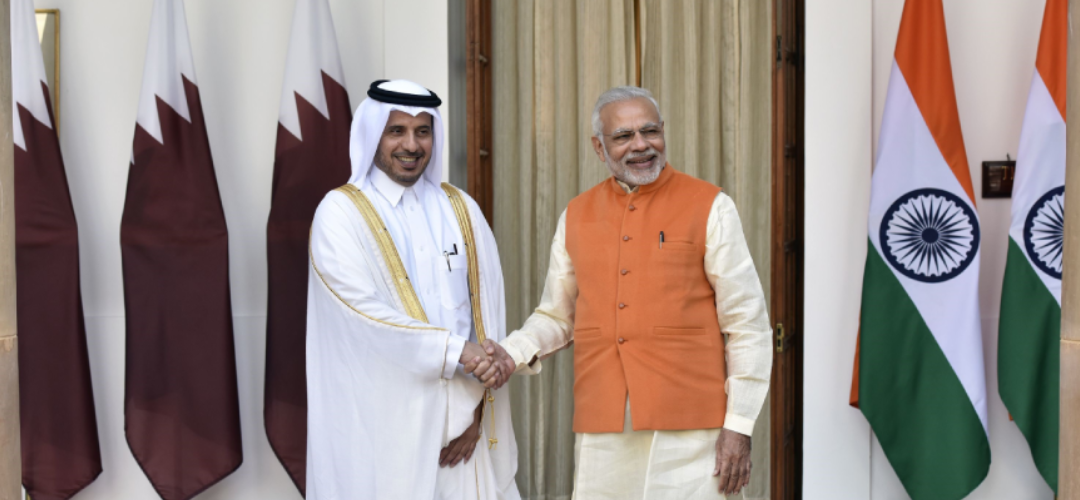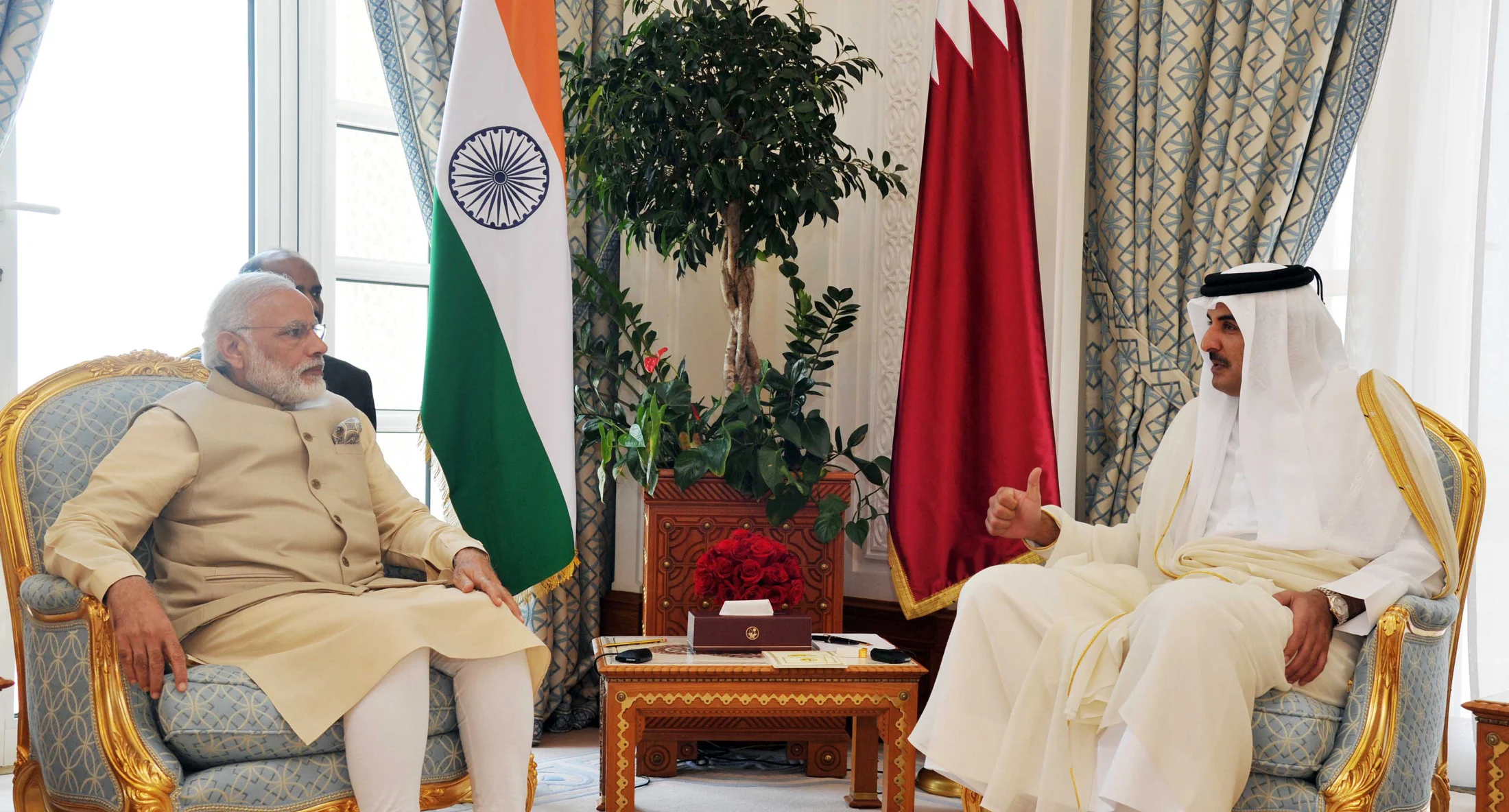Caught in a Web
November 4, 2023 | Expert Insights

Trouble had been brewing on the horizon for more than a year between India and Qatar, who otherwise enjoy a tranquil and mutually beneficial relationship. Indian media had reported the arrest of the eight ex-Indian Navy personnel, but thereafter, there was little traction on the news. Therefore, the country, and evidently even New Delhi, was caught by surprise when the Qatari court sentenced all eight to death.
After the public accusation of the Canadian Prime Minister, this was the second incident that has dented the international image of India in quick succession. Unlike the country-wide uproar to the Canadian accusations, this time, the response, both officially and in the media, including social media, has not only been subdued but also measured. Clearly, with the lives of eight Indian soldiers on the line, the nation does not want to muddy the water anymore and allow space for the government to work on their release.
Background
The veterans in question worked at Dahra Global Technologies, a defence service provider based in Qatar. Dahra engages in activities pertaining to equipment procurement and sales, system implementation, spare parts provision, after-sales support, comprehensive supply chain management, and assistance for land forces, marine sector, special task forces, coast guard, police forces, and similar entities. The veterans worked closely with the Qatari navy, facilitating the procurement and integration of Italian radar-evasive midget submarines.
The Qatari government arrested them last year. The charges mentioned espionage claims for a third country, which commentators have read to be Israel.
India and Qatar share a robust bilateral relationship that has flourished across diverse sectors since establishing diplomatic ties in 1973. With India maintaining an embassy in Doha and Qatar having diplomatic representation in New Delhi and a consulate in Mumbai, the two nations have cultivated a multifaceted partnership encompassing energy cooperation, trade and economy, cultural exchanges, and diplomacy.
In the realm of energy cooperation, Qatar stands as India's largest source of liquefied natural gas (LNG), supplying over half of India's total LNG imports. A pivotal player in this collaboration is Petronet LNG, India's leading gas importer, which has a significant long-term contract with Qatar to import 8.5 million tonnes per annum (mtpa) of LNG. India, aiming to increase its natural gas share in the energy mix from 6 per cent to 15 per cent by 2030, is set to augment LNG imports in the coming years.
Trade and economic ties have also strengthened, evidenced by a notable 33 per cent increase in trade volume between the nations in 2021-2022, reaching $17.2 billion. In the fiscal year 2022-2023, bilateral trade further surged to US$ 18.77 billion, with India exporting goods worth US$ 1.96 billion and importing commodities valued at US$ 16.8 billion from Qatar. India, ranking as the fourth-largest export destination for the State of Qatar, underscores its economic significance in the partnership.
Diplomacy and politics have thrived through regular high-level bilateral visits and constant telephonic exchanges between the Amir of Qatar and the Prime Minister of India. Defence cooperation serves as a cornerstone of the bilateral agenda, with India offering training opportunities in its defence institutions to partner countries, including Qatar.
The Indian expatriate community has played a pivotal role in fostering enduring friendships and multifaceted cooperation between India and Qatar. Diverse Indian dialects, including Hindi, Malayalam, Tamil, and Bengali, resonate in Qatar, reflecting the deep cultural integration between the two nations.

Analysis
The Indian government's Middle East policy has been characterised by a steady hand in building economic connections without any geopolitical preconditions save those of peaceful business-oriented policy frameworks. This approach of geoeconomic primacy has become an Asian brand in the 21st century, and India has gained dividends from it.
Alongside Saudi Arabia, UAE, and Israel, Qatar is one of India's most important partners in the Middle East. The decoupling of geoeconomics from geopolitics becomes all the more important in dealing with these espionage-related death sentences in order to maintain India's strategic momentum in the region.
However, the sentencing of servicemen has not been received well in India - a national indignation - which makes it a governmental priority to avoid the death sentence at all costs. However, a bullish diplomatic approach here holds little value, as trade-related sanctions are highly undesirable. This makes the task a lot more difficult for the Indian embassy in Doha and the Ministry of External Affairs (MEA).
Commentators have noted geopolitical predicaments playing a role in Qatar's decision over the death sentence and possibly complicating the diplomatic de-escalation of the same. Qatar is just coming off of a blockade led by Saudi Arabia, facing charges of harbouring terrorist groups. At the same time, it stands staunchly against the Israeli establishment in its pro-Palestinian stance. It even harbours the Hamas leadership within its borders. While this makes Qatar an effective mediator for Israel and Hamas, it bears no camaraderie with Israel as a state.
India's close relationships with Israel and Saudi Arabia stand contrary to Qatari political thought. Moreover, another source of discontent involves U.S. influence in the region. Pushing towards Israeli-Saudi normalisation, the U.S. intended to sideline the strategically growing Arab bloc in creating a coalition of allies - I2U2 and the IMEC. While the Indian outlook bore no geopolitical agendas, given its economy-first policy, the U.S. made no attempt to hide its desire to counter Chinese and Iranian influence in the region. Qatar likely felt sidelined in this development, much like other countries - China, Turkey, Iraq, and Egypt. The diplomatic process for securing the release of the prisoners will occur given this background, making trust-building a key aspect to consider for India.
Despite these geopolitical considerations, it is important to note that Qatar has not made public the charges against the ex-naval officers. Moreover, the Indian government has not received a formal charge sheet framed against the concerned prisoners. The decision was even more shocking as Qatar did give consular access to the prisoners for the past year. The sharp change in direction in the scenario is what concerns Indian diplomacy. Trade-dependent India might have to make concessions here that leave a lasting impression on the bilateral relationship.
The war in Gaza also complicates the situation. The charges have been understood to be those of espionage on behalf of Israel - the villain in Arab eyes in the unfolding tragedy in the Middle East. Qatar has expressed its utter opposition to these developments and maintains hostilities with Israel over its engagements in Gaza, going back to Operation Cast Lead in 2009, which resulted in 1600 Palestinian deaths. This time, the number stands at over 9000 and is rising. The Qatari position thus demands an impactful statement against the Israeli regime - and what better way to do it than to sentence its spies to death? Sadly, it is Indians who have been caught in the crossfire of an Israel-Qatar feud.
Assessment
- The Indian Ministry of External Affairs has its work cut out in extracting its citizens out of this mess. Despite its small size, Qatar is emerging as an independent-minded major player in the region, and India has to tread with tact and caution.
- India cannot afford to get caught taking sides in the deteriorating Middle East crisis, despite its strategic partnership with Tel Aviv and its energy and trade interests with the Gulf nations where millions of Indians work. It is a tightrope to walk, but Indian diplomacy has matured over the years and should be up to the task.
- It is a good sign that the nation as a whole has not adopted the jingoistic high-pitch response that we have gotten used to on our electronic and social media platforms. The government does not need mindless keyboard warriors to worsen the situation than what it already is.








Comments